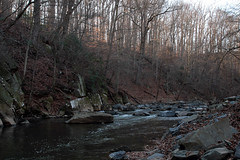Ecological Systems
Ecological systems are patterned clusters of natural communities that share many of the same natural processes.
Natural Communities' Broader Landscape Context
Just as we can recognize repeated groupings of plants and animals and identify them as natural communities, we can also step back and see yet larger patterns that repeat themselves in the landscape. These patterns define broader environments in which different natural communities tend to cluster together. We call these ecological systems.
 Steep banks and rapids where Rock Creek has cut down through rock.
Steep banks and rapids where Rock Creek has cut down through rock.
Photographer: Sam Sheline, courtesy of NatureServeEcological systems are partly defined by the natural processes (sometimes called "ecological processes") that operate on all the natural communities clustered together within them. Ecobit: Natural Processes are Bigger than Natural Communities
For example, at Rock Creek Park in Washington, D.C., four ecological systems are recognized.
- Dry Oak-Pine Forest at Rock Creek Park (an ecological system of dry hilltops, ridges, and upper slopes)
- Hardwood Forest at Rock Creek Park (an ecological system of steep slopes above streams, in this region)
- Mesic Hardwood Forest at Rock Creek Park (an ecological system of few extremes)
- Stream and Riparian at Rock Creek Park (an ecological system of narrow floodplains)


